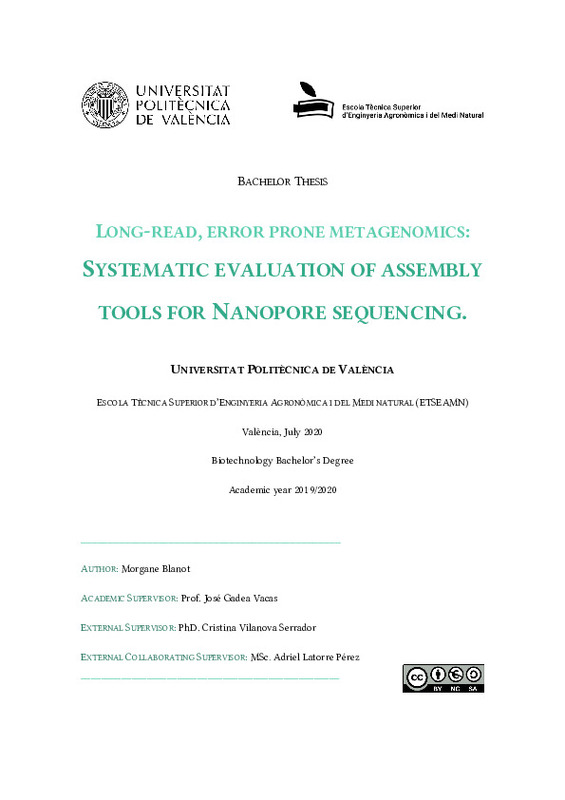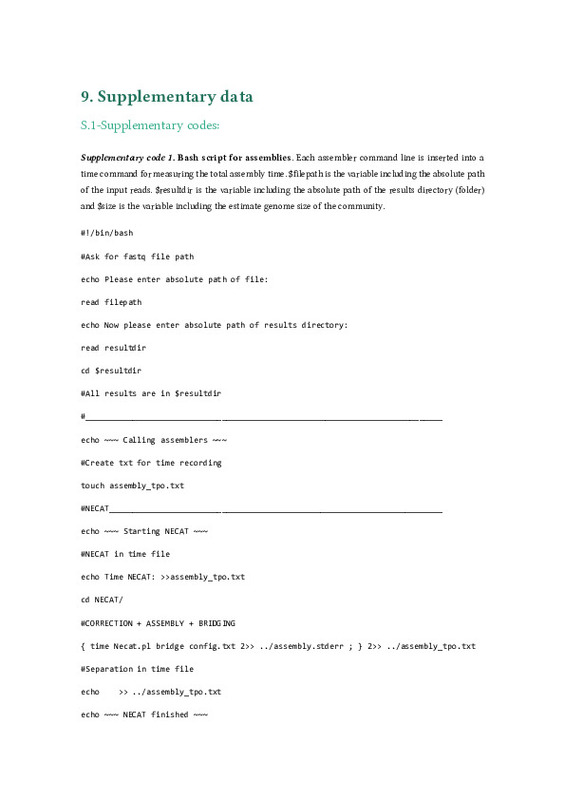|
Resumen:
|
[EN] Microorganisms can produce a wide variety of compounds and are key factors for understanding the behavior of ecological systems. Metagenomics is the tool for achieving this knowledge, studying microorganisms directly ...[+]
[EN] Microorganisms can produce a wide variety of compounds and are key factors for understanding the behavior of ecological systems. Metagenomics is the tool for achieving this knowledge, studying microorganisms directly from their source through different approaches: focusing on sequencing marker genes (metataxonomics) or puzzling up the whole genetic material into separate genomes (metagenomics). In the recent past, Illumina has been the most sequencing technology used. However, short reads generated by Illumina are hard to assemble, and they produce very fragmented metagenomes. Despite their high intrinsic error, third generation sequencing platforms harbor the potential to overcome this issue thanks to their ability to generate longer reads. In this regard, MinION (Oxford Nanopore Technologies) is very advantageous for metagenomics applications, since it is cheap, portable and provides information in real-time.
Many assemblers have been designed for dealing with error-prone data, but there is not a clear consensus about the tools to use to achieve the best results when handling MinION data. It is thus necessary to benchmark these tools and state what, why and when to use them. For that, using the best performing assemblers we know in the present, the aim of the present work is to analyze sequencing data from microbial communities of different complexities and systematically compare the metagenomes retrieved. The final goal of the study is to provide guidance for other scientists to choose the proper software, and to stimulate the rational development of tools and methodologies for this field.
[-]
[ES] Los microorganismos producen compuestos muy variados y son esenciales para entender el comportamiento de sistemas ambientales. La metagenómica es la vía para obtener este conocimiento, estudiando los microorganismos ...[+]
[ES] Los microorganismos producen compuestos muy variados y son esenciales para entender el comportamiento de sistemas ambientales. La metagenómica es la vía para obtener este conocimiento, estudiando los microorganismos directamente desde su hábitat usando diferentes enfoques: centrarse en secuenciar genes marcadores (metataxonómica), o montar todo el material genético en genomas separados (metagenómica). En los últimos años, Illumina ha sido la tecnología más usada para secuenciar; sin embargo, las lecturas cortas que genera Illumina son difíciles de ensamblar, y producen metagenomas muy fragmentados. A pesar de su alto error intrínseco, las plataformas de tercera generación tienen potencial para superar este inconveniente gracias a que pueden generar lecturas más largas. En este contexto, MinION (Oxford Nanopore Technologies) es muy conveniente para aplicaciones metagenómicas; ya que es barato, portable y proporciona información en tiempo real.
Se han diseñado muchos ensambladores para tratar con datos de mayor error intrínseco, pero no hay un consenso en cuanto a las herramientas que se deben usar para obtener los mejores resultados cuando se usa MinION. Es por tanto necesario evaluar estas herramientas y definir qué, por qué y cuándo usarlas. Para este propósito, y usando los mejores ensambladores que se conocen actualmente, la finalidad de este proyecto es analizar datos secuenciados de comunidades microbianas de varias complejidades y comparar sistemáticamente los metagenomas obtenidos, con el objetivo de orientar a otros científicos para elegir el software adecuado y estimular el desarrollo racional de nuevas herramientas y estrategias para este campo.
[-]
|








